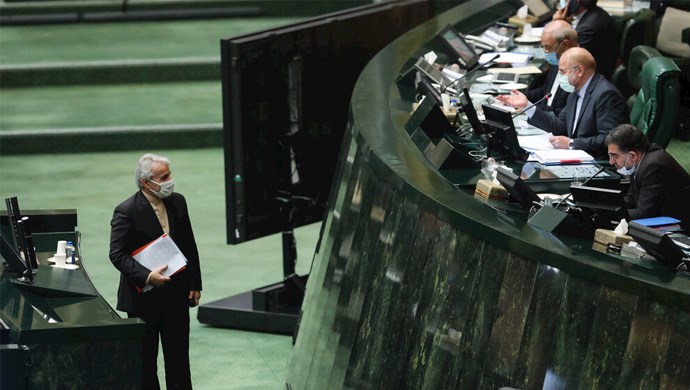Analysis by PMOI/MEK
Iran, February 18, 2021—After weeks of debate and back-and-forth, the Majlis (parliament) finally approved the government’s budget bill for the upcoming Persian year (starting in March) on Tuesday. According to ICANA, the official news agency of the Majlis, the reason the differences were resolved was the “implementation of the considerations of the Majlis” in the budget and “the government’s change of opinion after hearing the ideas of the MPs.” The news agency added that the Majlis was satisfied with the government’s decision to reform the budget.
What is at stake?
Two key issues being debated between the government and the Majlis were: 1) the source of income in the budget and 2) the government-specified exchange rate of the U.S. dollar.
The cabinet of regime president Hassan Rouhani has crafted the budget bill based on the daily sale of 2.3 million barrels of oil, and it was approved in Tuesday’s session.
According to MP Allahverdi Dehghani, who spoke in Tuesday’s Majlis session, “More than 50 percent of the bill depends on oil and it is not clear how it will be achieved.”
In a previous session, Mohammad Bagher Nobakht, the head of the Budget and Planning Organization had objected to increasing oil revenue figures in the budget bill, saying, “Don’t you read the secret reports? Don’t you know about oil income?” to which, he had added, “[Majlis Speaker Mohammad Bagher] Ghalibaf knows that our multi-hundred-billion-dollar income has been reduced to a few hundred dollars!”
To this, Ghalibaf had responded, “If you know that our oil exports are at a minimum, why have you projected to sell 2.3 million barrels of oil?” to which he added, “How has the government planned its expenses based on revenue that does not exist?”
But on Tuesday, the entire dispute was resolved and all objections were forgotten, and the Majlis approved what one of its members had described at “imaginary dependency on oil income” in November.
The second point of contention was the currency exchange rate. The official exchange rate of the rial, announced by the government, is 42,000 rials per U.S. dollar. However, the real value of the rial, being exchanged in the market is currently around 260,000 rials per U.S. dollar, more than six times the official price. Government agencies as well as individuals and organizations with close to the regime and its officials benefit from access to 42,000-rial dollars, which they would then sell at the market rate and make huge profits, an issue that has been time and again discussed on media. On February 10, the state-run Resalat daily acknowledged that with the official exchange rate, the government is “digging its hands into the pockets of the middle and lower classes.” On February 4, Resalat noted: “Since 2018, the profit generated from the 42,000-rial exchange rate is ten times larger than the entire yearly cash handouts being offered to the needy, and it has been deposited to the pockets of individuals who have access to this currency.” Resalat further noted, “The [people who are favored by the government] and had access to the 42,000-rial dollar were able to import their goods at this rate, but sold it at free market rates.”
This issue was also brought up in the disputes on the budget between the Majlis and the government and there were talks of changing the official rate. MP Ahmad Amirabadi Farahani warned on February 2, “The 42,000-rial exchange rate has driven huge profits to the pockets of a select few who are affiliated with government managers.”
But on Tuesday, all disputes over the exchange rate were set aside, and the Majlis effectively accepted the continued use of this tool of graft and financial corruption by approving the budget bill.
What happened?
So, why did the government and the Majlis set their differences aside suddenly without making any fundamental change to the matters of dispute? Nobakht hinted at the behind-the-curtain deals on Tuesday, saying, “It was agreed that we preserve the 42,000-rial exchange rate in the first six months of the next year (March-August 2021).”
Therefore, it became clear that all the show of dispute and debate was not about stopping financial corruption but a rivalry over how to distribute the spoils of plundering the country’s and the people’s wealth. The government and the Majlis were in fact jockeying to have their own levers and influence over the ton of profit that the corrupt practices of the regime generate. And now, these mafia gangs have reached a consensus that in the final six months of Rouhani’s presidency, his government will maintain its leverage of the 42,000-rial currency while his rivals will maintain control over their own cash cows, such as the free trade zones they use to import luxury goods and sell them at stellar prices.
While the big money will change hands and reach a balance between the high levels of power in the regime, the one thing that did not change in the budget is the conditions of the people, who will continue to suffer increasing inflation, skyrocketing prices, increased taxes, and a declining economy.





